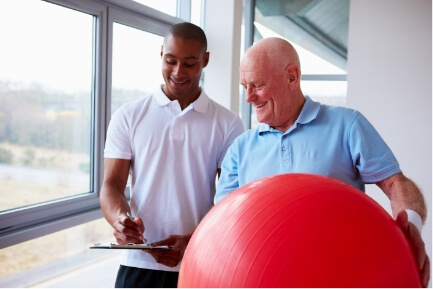What Do I Do If My Neck Pain Doesn’t Go Away?

When to See a Doctor About That Incredibly Frustrating Stiff Neck
A stiff neck will make you miss things that you sometimes take for granted, such as the opportunity to turn your head smoothly to, say, watch an adorable bound puppy past. You’re stuck doing a rigid full-body swivel with a stiff neck, like an alien who can almost behave like a dog, but not quite, and who is researching the canine species on earth.
The good news is that it is typically not a big deal to have a sore neck. Often, however, it’s a warning that you should go to a doctor for assessment.
First, pause for a second to appreciate what a wonderful machine your neck really is.
The head of a human being weighs between 10 to 12 pounds. That’s heavier than most newborns, FYI, and to sustain that weight, it’s up to your neck. Alan S. Hilibrand, M.D., a Rothman Institute orthopedic surgeon who specializes in spine disorders, says to SELF, “It’s more like a bowling ball lying on top of a bowling pin.”
So, how does your neck, or your cervical spine, if you want to be fancy, hold this load? All comes down to its foundation.
Mostly, your neck consists of seven interlocking bones (vertebrae), with room for your spinal cord behind them. If you love pastries, rejoice in the fact that you essentially always have some on you: each cushioned disc between your vertebrae is defined by the Mayo Clinic as “a little like a jelly donut, with a softer core enclosed inside a harder exterior.” Your vertebrae are also attached to ligaments and tendons that bind them to other structures, including your muscles. Together, all of this helps you balance your head on your feet.
Since your neck has such an important job, it’s just going to get stiff sometimes. Usually, this isn’t anything to worry about.
Neel Anand, M.D., professor of orthopedic surgery and director of spine trauma at Cedars-Sinai Spine Center in Los Angeles, tells SELF that neck stiffness is more than likely just inflammation due to pressure or strain. This can happen if, for instance, you slept unusually the night before. Or, if you sleep the way you usually do, it could be because the day before, you did something to damage yourself paper writer, but then you didn’t notice it.
“Dr. Hilibrand says,” [Stiffness] can grow overnight as muscles attempt to repair themselves. You probably know your ideal sleeping position already, but Dr. Hilibrand states that sleeping with your neck in a severe position of flexion (bending forward) or extension (bending back) is usually not healthy. Instead, choosing to sleep with your head and neck aligned with the rest of your body is advised by the Mayo Clinic.
Stiffness can also happen if your posture isn’t as good as it should be. “If someone has been sitting looking at a computer all day and their neck has been held in one position for a long time, eventually the muscles are going to tire,” Dr. Hilibrand says. The tendency to hunch over whatever you’re doing just exacerbates this, he says: “Typically you might be sitting there reading or studying and not in the ideal biomechanical position.” It’s best if your head is directly over your shoulders so your neck doesn’t have to do as much work.
Another cause of neck stiffness, along with possible spasms, is pushing yourself past your limit at the gym. “People who do upper-body weightlifting can get muscle spasms and neck stiffness because they do all these exercises that strain the muscles connecting the neck to the upper part of the back and shoulders,” Dr. Hilibrand says. This strain can also happen due to something like whiplash after a car accident.
Either way, neck tension is an indicator that your neck is actually attempting to shield itself by keeping you from further taxing the inflamed tissue, explains Dr. Hilibrand. The U.S. National Library of Medicine suggests helping your neck get back to normal by avoiding more stressful movements, taking an anti-inflammatory drug, using a cold compress to calm pain for the first 48 to 72 hours, and using heating pads to ease sore muscles.
Although the stiffness of the neck can be very natural, there are a few obvious indicators that you ought to see a doctor as soon as possible.
Neck stiffness may even lead to discomfort, but even that doesn’t mean it’s time to see your doctor right away. It’s all due to inflammation sometimes. The discomfort may also be a result of becoming older, and as your cartilage continues to decrease, you are more likely to develop sharp outgrowths known as bone spurs on the edges of your bones.
With that said, see a doctor if your neck stiffness comes along with any of the following:
- Severe pain shooting down your arms
- Weakness, numbness, or tingling in your arms or legs
- Problems controlling your bladder or bowels
- Balance issues
- Sudden clumsiness
- A recent accident or injury
- Severe headache
“These are absolutely reasons to see your doctor immediately; they can be indicative that something is putting pressure on or pinching nerves or the spinal cord,” Dr. Anand says.
You should also see your doctor ASAP or go to the emergency room if you notice these accompanying your neck stiffness:
- Sudden and high fever
- Confusion
- Increased sensitivity to light
- Nausea
- Vomiting
Neck stiffness may be a sign of meningitis, an infection triggered by a virus , bacteria, or fungus that inflames the membranes around your brain and spinal cord, if it comes with the symptoms above. According to the Centers for Disease Control and Prevention, bacterial meningitis can be fatal if not treated quickly enough. Don’t try waiting for it if you think you’ve got it.
Are You Looking for Relief From Neck Pain?
Pace Physical Therapy in San Jose, California specializes in non-surgical neck pain relief and recovery therapies. We pride ourselves on offering the best possible physical therapy available and going above and beyond for our patients. Our highly experienced physical therapist will work with you to improve your function and relieve your pain. We start by assessing the body as a whole. Oftentimes the cause of pain or an injury extends far beyond just the body part or muscle hurting. Without taking a comprehensive look at your entire self, we would be doing you a disservice in fully helping you heal and preventing future limitations. We then move on to fixing your areas of limitation. Not all diagnoses are created equal. One person with neck pain may have completely different limitations than the next person. Your recovery program needs to be specific to what YOUR body needs and not just the typical exercise program that you can find online. Just because your pain decreases or you can walk longer doesn’t mean that it is enough to get you functioning at the level you want to be. While this often signifies the end of care at your typical PT clinic we don’t stop providing guidance until we help you successfully meet every goal you set for yourself with us on day one. Contact us today to schedule your appointment!
This page is happily provided to you by Local SEO Magnified Media.


